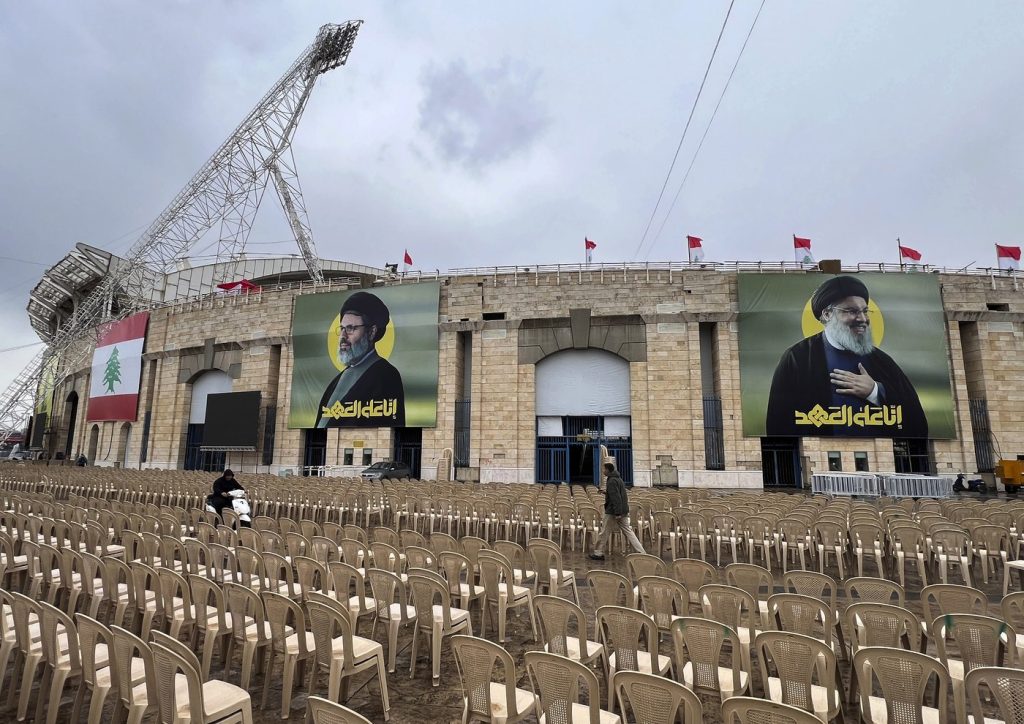BEIRUT (AP) — On Sunday, tens of thousands gathered at a stadium in Beirut for the funeral of Hezbollah's former leader, Hassan Nasrallah, who was killed in an Israeli airstrike on September 27, 2024. The airstrike targeted Hezbollah's main operations room, resulting in the loss of more than 80 bombs dropped by the Israeli air force, marking a significant setback for the Iran-backed group that Nasrallah had transformed into a dominant entity in the Middle East over his 30-year leadership.
As one of the founders of Hezbollah, Nasrallah had a deep-rooted influence among Iran-aligned factions in the region and was esteemed within the Iran-led axis of resistance that included various groups from Iraq, Yemen, and Palestine. Mourner Sahar al-Attar, who came from the Bekaa Valley, expressed her disbelief over the event, stating, “We would have come even under bullets” to pay their respects to Nasrallah.
High-profile officials from regions beyond Lebanon, including Mohammad Bagher Qalibaf, Iran's parliament speaker, and Foreign Minister Abbas Araghchi, were in attendance at the funeral, which was expected to be Lebanon’s largest in two decades. The two Iranian officials arrived on separate flights from Tehran, following a prior restriction on flights purportedly linked to Israel's accusations of Iranian support for Hezbollah's operations.
Ali Daamoush, a senior Hezbollah official, announced that approximately 800 dignitaries from 65 countries, along with countless supporters and activists from around the globe, would participate in the funeral. Daamoush urged supporters from “every home, village, and city” to join and demonstrate that “this resistance will stay and is ready in the field,” referencing their enduring opposition to Israel.
Nasrallah was to be interred later that day in Beirut, while his cousin and apparent successor, Hashem Safieddine, who also perished in an Israeli airstrike a few days later, would be buried in southern Lebanon. Both leaders had initially been interred in undisclosed locations, with Hezbollah announcing their official funerals earlier in the month.
The group encouraged massive turnout at the funeral to showcase its resilience after enduring significant losses during a 14-month conflict with Israel, which claimed many of its senior political and military leaders. Another severe blow came with the downfall of the Assad family's long-standing regime in Syria, a crucial ally, and conduit for Iranian support to Hezbollah.
As part of a U.S.-brokered ceasefire concluded on November 27, Hezbollah was restricted from maintaining an armed presence along the Israeli border. Rivals of Hezbollah have increasingly called for the group to disarm and transition into a purely political party within Lebanon.
To accommodate attendees, the stadium was organized to hold tens of thousands, with giant screens positioned outside to allow overflow crowds to participate in the memorial. Strict security measures were enforced, including road closures in the vicinity and a ban on drones in Beirut and surrounding areas. Furthermore, the Lebanese army and police forces were placed on heightened alert, and flights to and from Beirut's Rafik Hariri International Airport were scheduled to pause for four hours starting at noon.
In the hours leading up to the funeral, the Israeli military conducted strikes in southern Lebanon, claiming to have targeted a site containing rocket launchers and weapons. The funeral was titled “We are committed to the covenant,” reflecting Hezbollah's enduring stance and commitment to their cause amidst ongoing regional tensions.










